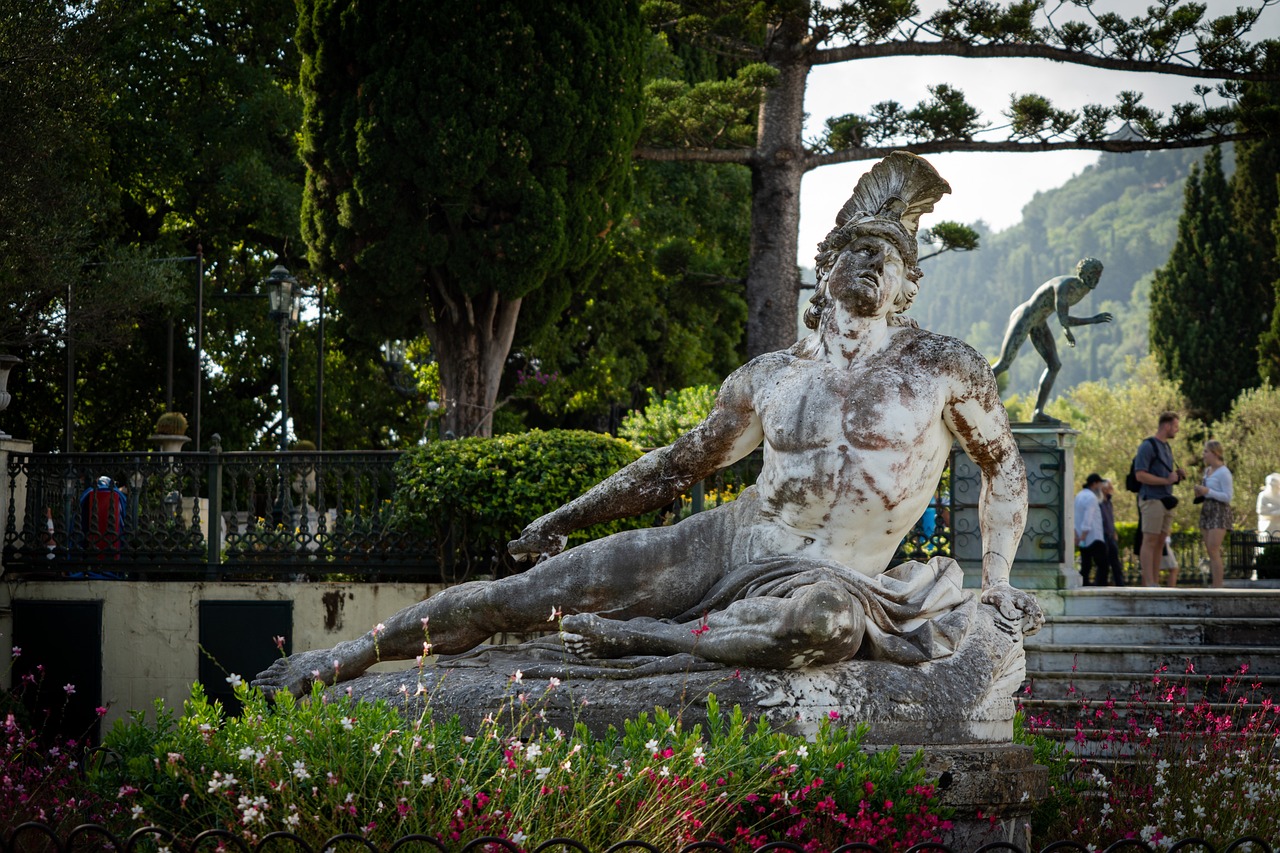Achilles, the offspring of Peleus and Thetis, stood as the foremost of Greek heroes in the fabled Trojan War. With a foreboding sense of destiny, Thetis sought to safeguard her son from his foretold fate. To this end, she immersed Achilles in the waters of the River Styx during his infancy, rendering nearly invincible except for the heel she held—his sole point of vulnerability. Unfortunately, this precaution proved in vain, as an arrow shot by Paris, guided by Apollo, ultimately struck his heel, leading to Achilles’ tragic demise. This arrow was unleashed by Paris, the sibling of Hector, who Achilles had previously slain in a fierce duel, a moment born out of vengeance for the loss of Achilles’ beloved friend, Patroclus.
Achilles’ Formative Years
Achilles’ origins are steeped in twin prophecies, one concerning his mother, Thetis, and another involving the hero himself. Raised in the care of the Centaur Chiron, he gained proficiency in various fields.
Thetis’ Prophecy
Achilles, born to Peleus, the king of Phthia, and Thetis, the oceanic goddess, was fated for greatness. Had it not been for interventions by Themis or Prometheus, he might have risen to surpass even Zeus. Prior to his birth, both Zeus and Poseidon vied for Thetis’ affection, but it was imperative for the divine order that she remained unattached, for it was foretold she would give birth to a son with unparalleled strength and capabilities.
The Prophecy of Achilles
Whoever disclosed this critical prophecy remains unknown, but their timing was crucial, as Zeus was poised to unite with Thetis. Peleus was carefully selected as Thetis’ spouse due to his piety as a mortal man unfit to sire an immortal heir. Themis ominously advised, “Let Thetis embrace a mortal’s bed, so she may witness the glory of her son dying in combat, a warrior like Ares in strength.”
Achilles’ Vulnerability
Thetis, distressed by her child’s foreseen death, endeavored to grant him true immortality. Some legends suggest she attempted to render him immortal by burning away his vulnerabilities. However, Peleus discovered her rituals, resulting in Thetis’ withdrawal from their lives, returning to the depths of the sea. Other accounts speak of her immersing him in the Styx, rendering all but his heel invulnerable—hence the term “Achilles’ heel,” referring to a crucial weakness disguised as a trivial one.
Educational Influence
In her absence, Achilles received instruction from Chiron on Mount Pelion, mastering skills from the arts to athletics. Returning home to Phthia, he formed lasting bonds with friends Phoenix and Patroclus, the latter deeply impacting his life.
The Trojan Conflict
The central theme of Homer’s “Iliad” features Achilles’ fury towards Agamemnon. During the final year of the Trojan War, his anger causes him to retreat from battle until grief over Patroclus’ death compels him back into the fray, leading the Greeks to confront Hector, Troy’s mightiest warrior.
Disguise and Deception
As the threat of the Trojan War loomed, Thetis endeavored to keep Achilles away by disguising him as a girl, concealing him within the court of King Lycomedes in Skyros. This strategy succeeded until Odysseus, informed by the seer Calchas, learned of Achilles’ whereabouts and exposed him. Using a guise of a merchant bearing jewelry and women’s garments, or feigning an assault, Odysseus uncovered Achilles’ hidden identity.
Early Endeavors
Despite not originally vowing to fight for Menelaus, upon reveal, Achilles aligned himself with the Greek forces, leading a formidable fleet. Yet, misdirections led them to Mysia, where Achilles engaged in battle with Telephus, that resulted in a significant injury that could only be healed by Achilles himself.
A further challenge arose when Agamemnon’s actions angered Artemis, prompting the goddess to withhold favorable winds until a human sacrifice was made: Agamemnon’s daughter, Iphigenia. Misled into believing she would wed Achilles, Iphigenia ultimately accepted her tragic fate, allowing the Greeks to set forth once more.
As their expedition drew close to Troy, Achilles disobeyed Thetis and vanquished Tenes, the island king, provoking revenge from Apollo, who harbored animosity towards Achilles.
Climax in the “Iliad”
The tenth year of the siege saw tensions rekindled when Agamemnon, forced to relinquish his trophy Chryseis, sought to claim Briseis, Achilles’ prize. Infuriated by the insult, Achilles withdrew from battle and beseeched his mother to persuade Zeus to aid the Trojans, showcasing the gravity of his loss.
In response, Zeus facilitated Trojan victories that made Agamemnon repentant. Despite attempts at reconciliation from Agamemnon, Achilles preferred a life in obscurity over returning to battle. However, after Patroclus fell at Hector’s hands, Achilles, fueled by vengeance, reentered combat wearing newly crafted armor, ultimately slaying Hector and desecrating his body in mourning.
The End of Achilles
Although Achilles’ death is foreshadowed by Hector, it remains unwritten in the “Iliad.” Following Hector’s demise, Paris, with assistance from Apollo, orchestrates Achilles’ death by striking his heel with an arrow, a price exacted for transgressing against the gods.
The Echo of Achilles
In “Odyssey”, Odysseus encounters Achilles’ spirit in the Underworld, where Achilles reveals his preference for even a humble life over ruling among the dead, reflecting on the bittersweet nature of his legacy.
Scholarly References
Achilles is extensively chronicled in Homer’s “Iliad,” alongside additional insights from Pindar and Apollodorus regarding Thetis’ attempts to grant him immortality and the interactions with his spirit in the “Odyssey.”



